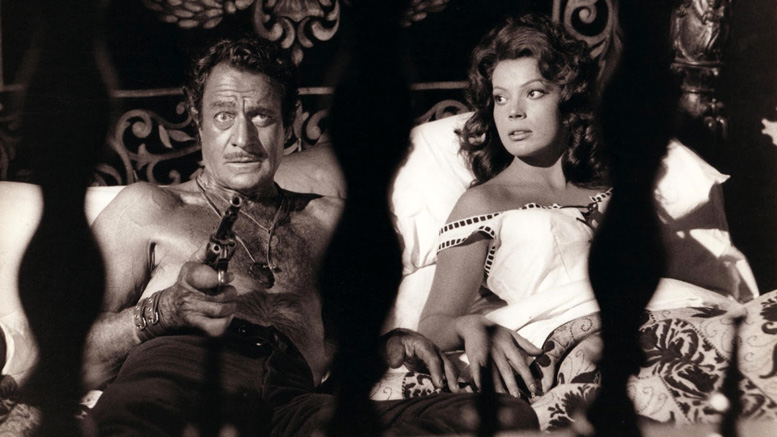 The nineties was a pretty desperate decade for Italian filmmaking, all things considered, but it’s not helped by the fact that the few films made that were worth watching received absolutely no kind of international distribution and were so difficult to hear about, let alone to see. One example of this is Cristina Comencini’s The End is Known, a classy thriller based on Geofrrey Holiday Hall’s little-remembered 1950 novel of the same name. Despite being a prime candidate for some kind of international distribution, this appears never to have had a proper English language release, beyond a subtitled broadcast on the Australian TV channel SBS.
The nineties was a pretty desperate decade for Italian filmmaking, all things considered, but it’s not helped by the fact that the few films made that were worth watching received absolutely no kind of international distribution and were so difficult to hear about, let alone to see. One example of this is Cristina Comencini’s The End is Known, a classy thriller based on Geofrrey Holiday Hall’s little-remembered 1950 novel of the same name. Despite being a prime candidate for some kind of international distribution, this appears never to have had a proper English language release, beyond a subtitled broadcast on the Australian TV channel SBS.
Bernardo Manni (Fabrizio Bentivoglio), a succesful young lawyer, is on his way home one night when he’s narrowly missed by the falling body of a man who has exited from the window of his luxurious, fourth floor appartment. His wife, Maria (Valérie Kaprisky), explains that it was a stranger who had forced his way into their home, claiming to be a friend of his, before becoming anxious and throwing himself to his death. Which only leaves Bernardo all the more confused, as he’s never seen the unfortunate man before and doesn’t have the faintest idea who he coud be.
After an autopsy, however, it becomes clear that the dead man is one Rosario Cantini, a former red brigade terrorist who had escaped from jail some 15 years previously and never been heard of again. Until now. Bernardo begins to suspect that his death may have something to do with a high profile trial he’s currently involved with, the defence of another former terrorist called Armando Bosi (Stefano Oppedisano), who has been accused of murdering a policeman in Turin. Increasingly preoccupied by events, he packs Maria off on holiday and begins digging into Cantini’s past to try and discover some clues, a course of action that soon brings him into conflict with the investigating magistrate, Carlo Piane (Massimo Wertmüller).
Nonetheless, he manages to discover that Cantini had been hiding out in Sardinia for several years, before returning to Turin – after being driven into a rage by something he’d seen in a fashion magazine – at almost exactly the same time that Bosi had suposedly committed his crime. And he had other hidden secrets as well, not least a wife, who nobody seems to know anything about…
This is an arty, involving thriller with some political elements, cleverly written by Comencini (Luigi Comencini’s daughter, a respected author in her own right) and Suso Cecchi d’Amico, whose scriptwriting credits go all the way back to 1946’s Rome Open City and include numerous classics of Italian cinema (Bicycle Thieves, Senso, Rocco and His Brothers, The Leopard, Metello and many more). It actually feels like the kind of thing that could have been made by Damiano Damiani in his later period, albeit with an emphasis on the mystery, rather than the crime, elements. It also anticipates – in ambience, style and attitude – a lot of the more recent thrillers that have been coming out of France, with their hapless protagonists caught up in nightmarish scenarios that act to undermine their upper-middle class sensibilities.
One of the most interesting aspects of the film is its attitude towards the former revolutionaries, who are gradually revealed to be as venal and shallow as anybody else, despite their so-called political convictions. And there are several interesting support characters as well: Cantini’s tarot reading Aunt, a former cellmate who makes a living as a grand chess master, the disheveled, easy-going Piane.
Comencini, who has gone on to make a variety of well received films, isn’t perhaps the flashiest of directors, but it all runs smoothly enough and, despite being rather talky, it’s also extremely involving and watchable: a giallo which feels hewn from a different type of material from the standard pseudo-Argento productions that dominate the genre. There are some particularly impressive scenes set in a ramshackle Sardinian town, and, technically, it’s all very impressive. It also benefits from an impressive cast: Fabrizio Bentivoglio is a frequent collaborator of Sergio Rubini, and does a great job in what could have been a rather unsympathetic part; Valérie Kaprisky was best known for her appearence in the duff US version of Breathless, but she’s actually rather good here; and there are nice turns for familiar faces such as Mariangela Melato (as an ex-revolutionary now left raising the kids), Daria Nicolodi (as a lawyer), Carlo Cecchi (a theatre actor who worked on Romano Scavolini’s early films and appeared in La scorta at around the same time) and Stefano Oppedisano (a bit part performers who turns up in numerous westerns and decameroticons)
Now if only some enterprising distributor could put together a nice DVD release…
 |
 |
 |
